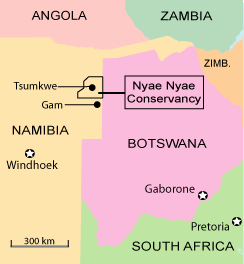Herero herders continue to move their cattle illegally onto the Nyae Nyae Conservancy, the Ju/’hoansi reserve in northeast Namibia, but the government appears to be responding fairly to the situation. Unlike Botswana, which continues to persecute the G/wi that want to live on their traditional lands in the Central Kalahari Game Reserve, Namibia is moving carefully to protect the Ju/’hoansi. At the same time, it seems to be seeking a solution that will help the poor Herero farmers.
 A Namibian news story last week reported that 29 Herero families have now invaded the Conservancy property with over 1,000 head of cattle. Ten additional people were caught trying to drive their animals into the reserve and were expelled, and 64 additional families have applied for permission to resettle on the Ju/’hoansi land. They apparently perceive that the open land is unused and free of the Dicaptalen weed (Dichapetalum cymosum), which is poisoning the cattle in the Gam area outside the fence where the invaders came from. First reports two weeks ago indicated that five families had invaded initially with 132 head of cattle.
A Namibian news story last week reported that 29 Herero families have now invaded the Conservancy property with over 1,000 head of cattle. Ten additional people were caught trying to drive their animals into the reserve and were expelled, and 64 additional families have applied for permission to resettle on the Ju/’hoansi land. They apparently perceive that the open land is unused and free of the Dicaptalen weed (Dichapetalum cymosum), which is poisoning the cattle in the Gam area outside the fence where the invaders came from. First reports two weeks ago indicated that five families had invaded initially with 132 head of cattle.
The problem for the settlers is that the Nyae Nyae reserve is not certified disease free, and if foot and mouth disease should infect any cows that would subsequently be moved back out of the reserve, the cattle industry in the nation could be sanctioned internationally. Namibian officials are taking a tough line against the invaders—or at least, against their cattle.
Mbeuta Ua Ndjarakana, Permanent Secretary from the Ministry of Information, Communication and Technology, told a meeting last week that the settlers may receive some support from the government, but he indicated that the cattle will not be allowed to leave the reserve. “I am not saying that the Government won’t take care of these destitute people, but those who have made the decision (to move the cattle) must live with the consequences,” he said.
Dr. Alaster Samkange, Chief of Veterinary Services in the northeast section of the country, told the meeting that cattle in the reserve will be ear tagged and branded shortly. He said that “if a settlement cannot be arranged, with the Ju-Hoansi Traditional Authority we will have to make some tough decision, but whatever decision we reach, it must be able to stand up to international scrutiny.” He made it clear that the farmers who moved their cattle on to the conservancy property will not be allowed to remove them. They can either sell their cattle there, or slaughter them.
Asked by some farmers at the meeting if the quarantine could be lifted, another veterinarian indicated that removing it would impose too high a cost to the nation’s beef industry. It would not be possible. He urged the farmers to stop moving their cattle into the reserve.
Former President, Sam Nujoma, the founding father of Namibia, advised the residents of Gam to consult with the traditional Ju/’hoansi leaders of Nyae Nyae and talk with the government before taking any actions like invading the reserve. The Ovaherero Traditional Authority submitted a letter to the government spelling out their proposals on behalf of the Herero people. Their letter requested the government to “kindly sympathise and accept families who crossed into Tsumkwe area to be settled permanently with their livestock.” Tsumkwe is the principal town in the Nyae Nyae Conservancy.
“Kindly look into the current situation of these families who crossed into Tsumkwe,” the letter continued, “and render some caring measures, (a) for the welfare and livelihood, (b) school children since they cannot sell their livestock, (c) the livestock for they cannot return to Gam area to avoid socio-economic implications.”
The Ovaherero Traditional Authority of the Okambazembi Royal House, joined by the Gam Farmers Association and the Local Development Committee of Gam, also submitted a letter. Their concern was for the danger to the cattle industry in the Gam area if it were to be reclassified as a red zone, which in effect would quarantine their livestock and deny them any markets.
Participants in the meeting said that requests by the Herero invaders, submitted to the Ju/’hoansi authorities for permission to resettle in Nyae Nyae, had been ignored. The Ju/’hoansi leader, Chief Tsamkxao Bobo #Oma, attended the meeting but did not comment publicly. He later told the press that the Ju/’hoansi depend on money from tourists and from trophy hunting. His implication was that their sources of income were threatened by the invasion. The chief also denied that he had received any written requests from the Herero invaders for permission to resettle on Conservancy land.
The local police commissioner, Nyambu Ndaitwah, said that his force will be monitoring the fence intensively to prevent further invasions, and he intends to have a permanent police presence along it until further notice. The police refuted reports in the media that some of the Herero cattle had been stolen.